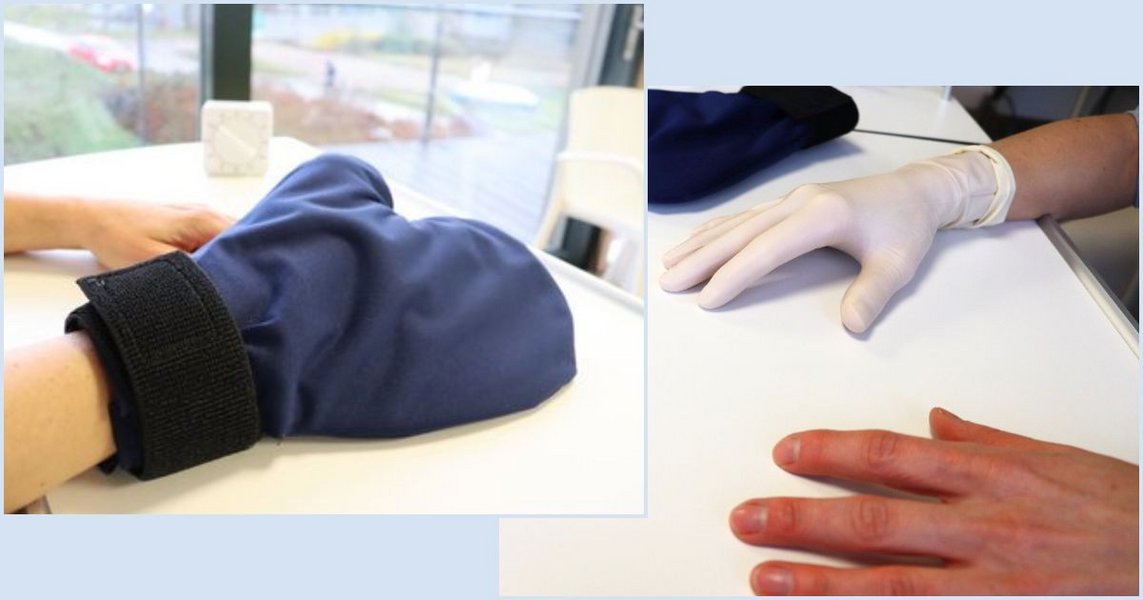POLAR: Effective Methods for Preventing Chemotherapy-Induced Polyneuropathy

In the POLAR study, doctors and nurses at the NCT Heidelberg investigated whether cooling or compression of the hands can prevent the development of chemotherapy-induced polyneuropathy (CIPN) in breast cancer patients. The study was funded by the “Donations against Cancer” program. The results, which are highly relevant for patient care, have now been published.
CIPN, a damage of peripheral nerves, is a common side effect of taxane-based chemotherapy. It often leads to a dose reduction or even to premature discontinuation of therapy. In up to 30 percent of patients, CIPN is permanent and often results in significant limitations to quality of life. To date, there are no known effective preventive or therapeutic measures.
Initial research with a small number of patients had shown that cooling or compression of the hands could have a preventive effect on the development of CIPN. The POLAR study systematically tested this assumption in a clinical study between 2019 and 2022.
In the randomized clinical trial, 122 breast cancer patients were divided into two groups: one group received gel-filled cooling gloves during chemotherapy, while the other group received compression using surgical gloves that were one size too small. The untreated hand served as a control in each case.
The results show a significant reduction in severe CIPN (CTCAE grade ≥ 2) in both intervention groups:
- Hand cooling: 29% of patients developed severe CIPN in the cooled hand, compared with 50% in the untreated hand
- Compression: 24% of patients developed severe CIPN in the hand with a compression glove, compared to 38% in the untreated hand.
Both methods thus significantly reduced the risk. The results suggest that cooling and compression are simple and cost-effective measures that can improve the quality of life of breast cancer patients. Laura Michel, senior physician in the Department of Gynecologic Oncology and principal investigator at NCT Heidelberg, says: “Our results are an important step towards improving the prevention of side effects in breast cancer patients. Cooling or compression should be routinely integrated into treatment with taxane-based therapy.”
POLAR: Effective Methods for Preventing Chemotherapy-Induced Polyneuropathy

In the POLAR study, doctors and nurses at the NCT Heidelberg investigated whether cooling or compression of the hands can prevent the development of chemotherapy-induced polyneuropathy (CIPN) in breast cancer patients. The study was funded by the “Donations against Cancer” program. The results, which are highly relevant for patient care, have now been published.
CIPN, a damage of peripheral nerves, is a common side effect of taxane-based chemotherapy. It often leads to a dose reduction or even to premature discontinuation of therapy. In up to 30 percent of patients, CIPN is permanent and often results in significant limitations to quality of life. To date, there are no known effective preventive or therapeutic measures.
Initial research with a small number of patients had shown that cooling or compression of the hands could have a preventive effect on the development of CIPN. The POLAR study systematically tested this assumption in a clinical study between 2019 and 2022.
In the randomized clinical trial, 122 breast cancer patients were divided into two groups: one group received gel-filled cooling gloves during chemotherapy, while the other group received compression using surgical gloves that were one size too small. The untreated hand served as a control in each case.
The results show a significant reduction in severe CIPN (CTCAE grade ≥ 2) in both intervention groups:
- Hand cooling: 29% of patients developed severe CIPN in the cooled hand, compared with 50% in the untreated hand
- Compression: 24% of patients developed severe CIPN in the hand with a compression glove, compared to 38% in the untreated hand.
Both methods thus significantly reduced the risk. The results suggest that cooling and compression are simple and cost-effective measures that can improve the quality of life of breast cancer patients. Laura Michel, senior physician in the Department of Gynecologic Oncology and principal investigator at NCT Heidelberg, says: “Our results are an important step towards improving the prevention of side effects in breast cancer patients. Cooling or compression should be routinely integrated into treatment with taxane-based therapy.”







